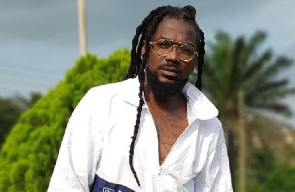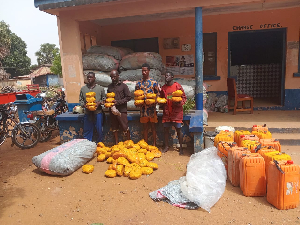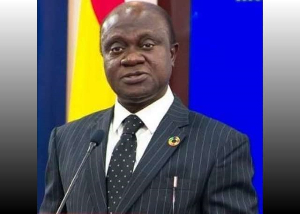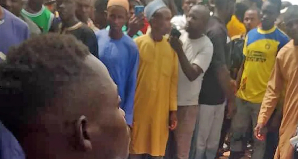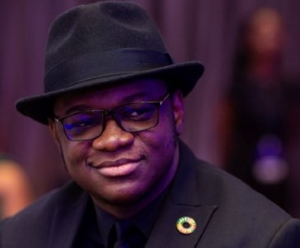Joseph Amoah’s emergence as a world-class sprinter at Coppin State might never have happened if his passion for soccer had taken hold.
Growing up in Ghana, the West African country where soccer is the national sport, Amoah yearned to blossom into the type of footballer who could contribute to the country’s success, which includes four African Cup of Nations crowns and three straight World Cup appearances from 2006 to 2014. But after enrolling in high school, Amoah came face to face with reality.
“In my high school, the soccer team was so good that the only chance I had was to join the track team,” said Amoah, who will compete at the Aliann Pompey Invitational in Guyana on Saturday. “It was a difficult decision because I knew that I had played more soccer than track, but I knew I wouldn’t make the team because the team was that good. So I just had to go the other way.”
That decision has been plenty productive for the 22-year-old Amoah. In his final performance as a junior at Coppin State, Amoah earned first-team All-America status in the 100- and 200-meter races, finishing eighth in 10.22 seconds and sixth in 20.19, respectively, on June 7 at the NCAA Division I track and field championships in Austin, Texas.
He joined Texas Tech junior Divine Oduduru, Oregon senior Cravon Gillespie, Florida sophomore Hakim Sani Brown and Houston senior Mario Burke as runners to qualify for the finals in both sprints.
Amoah’s time of 10.01 seconds in the 100 preliminaries June 5 eclipsed his previous school record of 10.09 and is tied for the 15th-fastest mark in the world this year. That time helped Amoah qualify for this fall’s International Association of Athletics Federations world championships in Qatar and the 2020 Summer Olympics in Tokyo. It was one of several showings that drew the attention of American sprinter Leroy Burrell, who twice set the world record in the 100.
Less than an hour later, Amoah finished a 200 preliminary in 20.08 seconds. That time broke his own program record (20.20) and bested the previous Ghanaian mark of 20.15 set by Emmanuel Tuffour in 1995.
Amoah — who was named the United States Track and Field and Cross Country Coaches Association’s Mid-Atlantic Region Track Athlete of the Year before the NCAA championships — said becoming a first-team All-American in two events in the same season was his yearlong objective.
“That’s one achievement that every athlete in the NCAA wants to get,” he said. “That was the main goal from the beginning of the season. Coach [Carl Hicks] kept on hitting on that goal, telling me every time at practice, ‘We all know the goal.’ … So, getting to that level and reaching the finals is a very big achievement. Being a first-team All-American is something that’s going to be with you forever.”
Former Olympic athlete Dan O’Brien, who served as an ESPN analyst at the NCAA championships, said Amoah’s performance is a reminder that speed is not monopolized by a select group of powerhouse programs.
“The one thing that I’m always amazed at is to see kids from mid-majors or non-Power 5 schools get this far at the NCAA championships,” said O’Brien, the 1996 Olympic gold medalist in the decathlon and a three-time world champion in that event. “That wasn’t always the way it was. It was the Pac-12 and the SEC. it was always the large conferences that were represented in the sprints. So, to go to a North Carolina A&T or a Coppin State, I think it’s pretty impressive that people are running that fast.”
Hicks, who has been Coppin State’s head coach for the past 20 years, credited assistant coach Jamie Wilson with adding the 400 to Amoah’s regimen as a way to increase his strength and refine his finishing kick. But Hicks said Amoah’s drive to succeed is his greatest asset.
“He was determined to be back at nationals and try to place high,” Hicks said. “So it was not a surprise at all.”
The second of four children to Thomas and Alberta Amoah, Joseph Amoah said he won “a lot” of regional championships in individual and relay events for Prempeh College high school in Kumasi, Ghana, and was named the school’s sport man of the year in 2014. But after wrapping up his prep career, Amoah said he chose to walk away from track before enrolling at Kwame Nkrumah University of Science and Technology (KNUST) in Kumasi.
But Mohammed Abubakar, the track and field coach at KNUST, called Amoah’s uncle, Dr. Victor Antwi, who convinced his nephew to try out for the team.
“My uncle is someone who really inspires me and motivates me,” Amoah said. “He pretty much took care of me because my dad lives in Canada. My uncle is pretty much the one who took care of me since I was in middle school. And I still talk to him. Everything he says, I take it seriously. So once he said it, I had to go back.”
One of Abubakar’s former athletes, Martin Owusu-Antwi, transferred to Coppin State and told Hicks about Amoah, who won the seniors meet of the Ghana’s Fastest Human competition in 2016. Hicks contacted Abubakar, laying the groundwork for recruiting Amoah to the Eagles.
After arriving in January 2017 and seeing snow for the first time when his plane landed at the airport, Amoah participated in his first indoor meet in Boston and won the 200.
“My assistant coach [Lawrence Givens] watched him and showed a videotape of his first race, and it was an indoor race, which was new for him because he had never run indoor before,” Hicks said. “Although he won, he left a whole lot on the track, and my assistant coach called me up and said, ‘This guy can really go. All he has to do is learn how to run.’ ”
The coaches refined Amoah’s technique. They adjusted his arm movement from a slight side-to-side movement to a chin-to-hip direction. They also honed his drive out of the blocks at the start of races.
Last spring, Amoah finished 13th in the 200 at the NCAA championships in Eugene, Ore. That experience changed his view on practice.
“I knew I had to work harder because I had been there and I had seen what it is,” he said. “It’s not just about going there to run and think, ‘Oh, any position I get is OK.’ You really have to fight because these guys are working really hard, too. So I told my teammates about the experience and how I would like us to be there and how we really had to work hard and train hard. Sometimes I’d go to practice and be like, ‘No, I don’t feel like practicing today.’ But knowing where I wanted to go and how hard it is to get there, I had to put everything aside and work hard at practice, take my diet seriously, and get a lot of rest.”
Coppin State sophomore Joseph Manu has known Amoah since they attended Prempeh together in 2012, and he said Amoah is no longer the teenager he had beaten several times.
“He goes fast, and in the end, he jogs, and we would be struggling to try to catch up,” Manu said. “So we knew he was going to run really fast [at the NCAA championships]. I even thought he was going to run 19 seconds in the 200.”
Amoah said he will remain in Baltimore to train for the African Games in Morocco in August and then the IAAF championships the following month. Hicks said Amoah could forgo his senior year and focus on a professional career if a sponsor, or several, decide to invest in him. But O’Brien hopes Amoah returns for a shot at NCAA titles in the 100 and 200.
“I think he needs to get through the season and evaluate, ‘Where am I on the world level?’ and then he can make that decision then,” O’Brien said. “He may have a sponsor in the next month. But I don’t like to see kids rush into the pro ranks and then not pan out because there are more kids that don’t pan out by going to the next level than those who do.”
Amoah said his primary focus is graduating with a bachelor’s degree in accounting and then considering whether to pursue a pro career or a master’s degree. And then there’s the 2020 Summer Olympics.
“Every athlete hopes to be an Olympian, and being able to qualify for the 2020 Olympics is the thing for me,” he said. “So in the future, that’s one of the places where I want to be, but I’m just not really thinking about it right now. It’s almost a year away. Maybe after college, I’ll consider my professional career and where I can go from there. But I think that’s something I’ll think about after I’m done with my undergrad.”
Sports News of Thursday, 29 August 2019
Source: Baltimore Sun
Prempeh College to Coppin State: The story of sprinter Joseph Amoah
Entertainment
